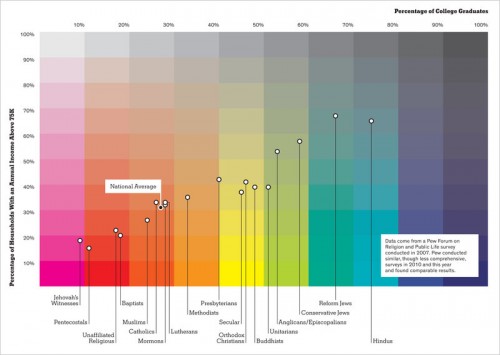Dmitriy T.M. sent in a link to an article by David Leonhardt in the New York Times about differences in income between various religious groups in the U.S. This graph shows the percent of households earning more than $75,000 a year (the numbers along the side; and note that, somewhat counterintuitively, the shade of each color gets lighter as the percentage gets higher), as well as the percent of each group with a college degree (along the top). In order from least to most educated, we have Jehovah’s Witnesses, Pentecostals, the unaffiliated, Baptists, Muslims, Catholics, Mormons, Lutherans, Methodists, Presbyterians, those who identify as secular, Orthodox Christians, Buddhists, Unitarians, Episcopalians, Conservative Jews, Reform Jews, and Hindus. Not surprisingly, income is pretty strongly correlated with education:
The data come from a 2007 Pew Forum on Religion and Public Life survey (which we’ve posted on before), though the NYT reports that they did smaller surveys in 2010 and 2011 and found similar patterns.
Also see our posts on the demographics of the non-religious and religion, income, and 2008 Presidential voting behavior.








